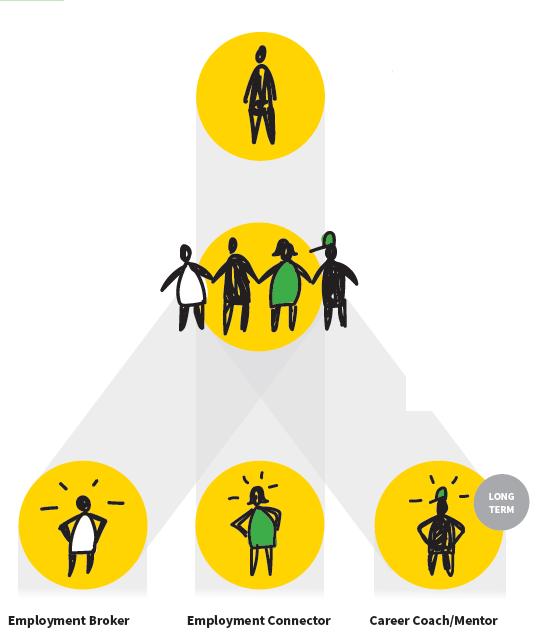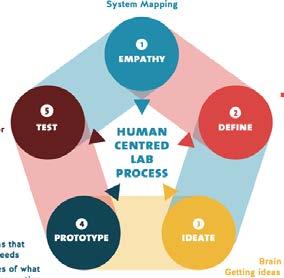
5 minute read
The Prototypes
The following three prototypes, outlined in more detail below, were generated in this social innovation process. The prototypes reflect the multiple challenges the Bhutanese community experiences in seeking employment. Co-designed with the Bhutanese community, the prototypes demonstrate how to build on the strengths and talents ofthe community to fulfill their aspirations for a productive and secure future in Canada.
25
PROTOTYPE 1
The Big Idea in a Nutshell
An experiential, supplemental English language learning program that supports newcomers in developing speaking/listening skills specific to employment so that they can get a job earlier in the English learning process. This innovative program is envisioned as an ‘elective’ course that complements the alreadywell-established Language Instruction for Newcomers to Canada (LINC) program in Canada.
Who this Prototype is For
This program supports vulnerable populations with complex barriers to employment newcomer groups who do not have a job but would like one, and who have ‘beginner’ to ‘low intermediate’ English speaking/listening language skills (Stage 1 on the Canadian Language Benchmarks). These individuals may have limited literacy in their native language.
The Problem this Prototype Solves
Existing English language courses emphasize raising an individual’s overall language level. While this is important, it does not enable individuals who require immediate employment to support themselves and theirfamilies, to gain the speaking/listening language skills necessaryto get a ‘survival’ job.
26

KeyLearningAfterTesting
This prototype has been field tested! Members ofthe Bhutanese community came togetherwith the prototype team to try out this model. This included a mini classroom session followed by a field trip to a local grocery store. After the test the group debriefed the experience. The following emerged as key learnings:
The Bhutanese community members felt this type of English class would be helpful and fill a gap that currently exists in their English learning Community members liked that it would be offered in conjunction with LINC classes - a program that they are already connected to The experiential component was key! It was important to go out and experience things rather than just sit in a classroom Members liked that the content could be responsive and emergent to their current needs/challenges
WhereThings areAt Now...
Multicultural Health Brokers Cooperative is currently exploring the possibility of piloting this program in collaboration with local English Language Learning organizations.
27
PROTOTYPE 2
SUPPORTED MICO-ENTERPRISE
The Big Idea in a Nutshell
Guided help and hands on support for members of new-comer communities who are interested in using their unique talents and skills to start a small home-based business.
Who this Prototype is For
Members ofthe Bhutanese community and other similar cultural groups who are looking to use their unique talents and skills to start a small home-based business for supplementary income.
The Problem this Prototype Solves
New-comers who want to start a small business are often at a disadvantage and quickly become frustrated with the process of beginning a business.
28
KeyLearningAfterTesting
To test this prototype, we facilitated a meeting between someone with an established relationship and strong working knowledge ofthe Bhutanese culture with a Bhutanese community member and trialled selling crafts at a local market. In this process we learned:
The guide is essential for success. Challenges cannot necessarily be predicted and without the essential support of a guide, the individual would be unable to pursue this pathway to employment. Trust is essential for success. The guide must have a deep understanding ofthe individual’s cultural background to be able to bridge between the individual’s home and Canadian contexts and must work to establish a strong and trusting relationship with the individual. Selling hand-made goods at market may not be a sustainable source of income for all newcomers as it can be challenging to get a small business up and running. However, Bhutanese community members indicated this can be a great ‘side hustle’ and opportunity to build confidence and hone skills.
WhereThings are at Now...
Through testing we learned that this may not be the best pathway to gain ful employment for all newcomers but can become a great ‘side hustle’. Due to limited time and resources on the part of our project team, no further development ofthis prototype has taken place. However, with the right partners and funding, we could see this prototype being refined and developed into a successful program.
29
PROTOTYPE 3
COMMUNITY LED EMPLOYMENT BROKERING
The Big Idea in a Nutshell
This prototype is a sustained process of employment support, career guidance and workplace mentoring for multi-barriered newcomer communities with limited access to employment opportunities.
Who this Prototype is For
Members of smaller newcomer communities who may have different levels of literacy & English, education (training) and previous work experience and encounter multiple-barriers to gainful employment.
The Problem this Prototype Solves
Expanded access to information about employment opportunities and services is needed, particularly for refugee and new-comer communities with specific cultural and language barriers. These multi-barriered communities require outreach to develop relationships with employment service providers.

30
WhatWe’ve Learned from Testing So Far...
We’re only part way through testing this prototype. In the first phase of testing we assembled an employment brokering team consisting of a newcomer seeking employment, a cultural broker, and an employment connector. Together they’ve explored the newcomer’s career goals, current skills and talents, and done a scan of potential job opportunities. Some important learnings have come from testing so far including:
Having both a cultural broker (someone with deep knowledge ofthe cultural background ofthe newcomer) as well as an employment connector (someone with deep knowledge ofthe employment landscape in Edmonton) is critical Newcomers benefit when employment supports are directed both at individual and community needs Trusting relationships are essential in building confidence and readiness of newcomers to participate in employment assistance programs Working closelywith relevant employers ensures that interests and concerns are addr essed once a newcomer is connected with them
WhereThings are at Now...
To furthertest this model, we are organizing an Employment Resource workshop hosted by the Bhutanese community. In doing so we are bringing Bhutanese community members/leaders and employment agencies togetherto plan and execute the event. After the event, we will coordinate a reflection session to bring stakeholders together to reflect on the experience and discuss follow-up activities.






